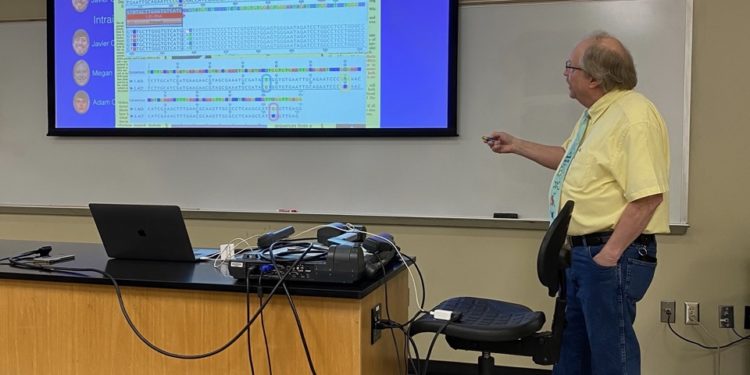Ashleigh Jones / Contributing Writer
Professor David A. Johnson, a genetics and molecular biology professor soon to retire from Samford, gave a presentation on March 22 to highlight his scientific research with students and colleagues over his extensive career.
His presentation, titled “A Turtle, a Parasitic Plant, a Worm, and other Creatures: 40 years of Student Research” was a part of the Spring Seminar Series for the Biological and Environmental Sciences department. In this series, professional guest speakers and experts give lectures on various topics in biology and medicine.
Johnson’s talk focused on his research work completed over his career with students and colleagues. Earning both a Bachelor of Science in biology degree in 1971 and a Masters degree from Samford in 1973, he went on to earn his Ph.D. at Emory University studying fruit flies.
During his talk, Johnson shared stories of his travels around the nation and world where he performed field and lab research. Before joining Samford’s faculty in 2008, he served as a teaching missionary for nearly 20 years at Seinan Gakuin University in Fukuoka, Japan. During that time, he studied multiple creatures, including a ladybug species that lived in both Fukuoka and Okinawa, Japan. The audience chuckled when Johnson recalled the time he and his wife collected ladybugs for research.
“Our 25th anniversary we went to Okinawa, and she’ll probably tell you that we spent probably well over half of our time collecting ladybugs,” he said.
Johnson also spent time studying the yellow pond turtle in Japan. This turtle is distributed throughout mainland China, Taiwan, and the Ryukyu islands. However, one invasive population was found in the rice paddies surrounding Kyoto, an unlikely place where these turtles should not have been found.
“It was probably brought in to the ancient capital (Kyoto), but no one knew exactly from where and why,” Johnson said.
He said that some think the turtles were brought to Kyoto for food (turtles are eaten for food in east Asia). Another hypothesis suggests that in the past these turtles were brought to Kyoto from China because royalty would use their shells for ritualistic, fortune-telling purposes.
“We wanted to try to find out where that turtle actually came from,” Johnson said.
Despite not being able to get all the samples he needed to fully answer his research questions, Johnson’s results confirmed what was already thought about these turtles.
“The sequenced data that we got gave a slight increased probability that our turtle came from mainland China, which was the current thinking,” Johnson said.
Along with colleagues and students, Johnson has had the chance to work with a variety of organisms such as tiny ciliates, planarian worms, mosquito fish, frogs, dogs, insects like the kudzu bug and honeybee, a parasitic plant called dodder (genus Cuscuta), and many others.
In his presentation, Johnson mentioned how problem-solving keeps genetic research fascinating.
“It is what interests me about genetic research—being able to take some really strange problem that maybe has nothing to do with science—maybe it has to do with history and culture—and apply science and try to answer some questions related to that,” he said.
Even though Johnson will be retiring from Samford, his love for genetics will continue.
“The whole life process to me is just so fascinating,” he said, referring to genetic processes that enable life to function.“The discoveries are happening all the time…There is always something new.”
Johnson’s presentation will be followed by three more lectures on March 28, April 4, and April 11. Guest speakers will include Ashley Spann, M.D. from Vanderbilt University, Felicia Hataway, M.D. from UAB, and Mary Katherine Ray, Ph.D. from Washington University. All events will take place at 3:30 p.m. and will be located in Propst Hall room 109 and on Zoom for those who cannot attend in person.






